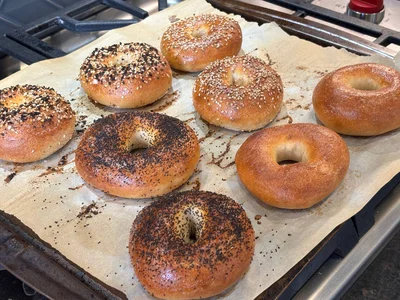Bagels
Starter
1.
In a large bowl or the bowl of your stand mixer, stir together the starter ingredients to make a shaggy dough, then use your hand to knead gently until thoroughly combined. (This may take about a minute; it's quite stiff.) Cover the bowl and let the starter rest at room temperature for 4 to 14 hours; it should expand.
| 1 cup | Bread Flour |
| 1⁄8 tsp | Table Salt |
| 1⁄16 tsp | Instant Yeast |
| 1⁄3 cup | Water |
Dough Preparation
2.
Add the remaining dough ingredients in the order listed to the bowl with the starter. Mix to bring the dough together, by hand or at low speed of a stand mixer with the dough hook attachment. Next, knead the stiff dough until it’s supple and elastic. This will take up to 15 minutes by hand or 8 to 10 minutes at medium-low speed with a mixer.
| 1⁄3 cup | Water |
| 2 tsp | Non-Diastatic Malt Powder |
| 1⁄16 tsp | Instant Yeast |
| 1⁄8 tsp | Table Salt |
| 1 cup | Bread Flour |
3.
Place the dough in a lightly greased bowl and let it rest, covered with a reusable cover or plastic wrap, until it doubles in bulk. This will take about 2 to 2 1⁄2 hours depending on the warmth of your kitchen.
Shaping
4.
Turn the dough out onto a clean surface, gently deflate it, and divide it into eight equal pieces (80g to 85g each).
5.
Working with one piece of dough at a time, fold the edges into the center. Pinch to seal and set aside. Repeat with the remaining pieces of dough.
6.
Starting with the first piece of dough you shaped, place it seam-side down on an unfloured surface. Use your cupped fingers and palm to roll the dough into a tight ball, moving your hand in a circular motion. The dough should stick slightly to the surface in order to create tension to yield a smooth exterior. If the dough is unmanageably sticky, add a very light dusting of flour; if the dough slides around on the surface without tightening, use a damp towel to clean and moisten the surface and try again.
7.
Once shaped into a tight ball, place the dough onto a lightly floured surface and repeat with the remaining pieces of dough.
8.
Cover the pre-shaped dough and allow it to rest for 10 to 15 minutes.
9.
Line a baking sheet with parchment and lightly grease the parchment; or sprinkle the parchment lightly with cornmeal, semolina, or farina, to prevent the bagels from sticking.
10.
Working with one piece of dough at a time, use your finger to poke a hole through the center. Gently rotate the dough to expand the hole to 2” to 3” in diameter, forming a ring shape. Place the shaped bagel onto the prepared baking sheet. The hole will close up a bit; that’s OK.
11.
Repeat with the remaining pieces of dough. Place the bagels on the baking sheet in a 3–2-3 arrangement to allow them to fit nicely on one pan.
12.
Cover the bagels with a reusable cover or lightly greased plastic wrap and let them rest until they feel slightly puffy to the touch, about 30 minutes.
Cooking
13.
While the bagels are resting, preheat the oven to 450 °F. Combine the water and malt powder in a wide, shallow pot; the water should be at least 1 1⁄4″ deep. Bring the mixture to a boil.
| 1⁄3 cup | Water |
| 2 tsp | Non-Diastatic Malt Powder |
14.
Add bagels to the water two or three at a time to avoid crowding. Boil for 60 seconds, then use a dough whisk or slotted spoon to turn the bagels over. Boil for another 60 seconds before removing from the water and placing on the prepared pan.
15.
If adding a topping, brush each bagel with the egg and water (egg wash) and dip into a bowl of your desired topping before transferring back to the pan.
16.
Bake the bagels until golden brown, 18 to 22 minutes. Rotate the pan (front to back, back to front) halfway through baking to ensure even browning.
